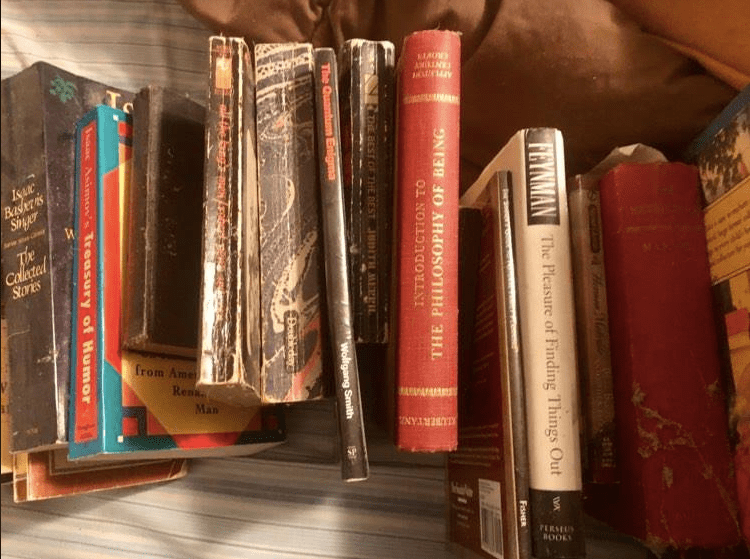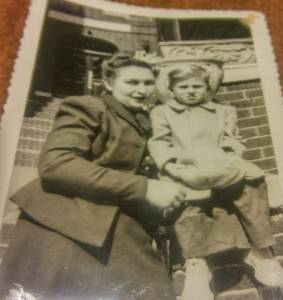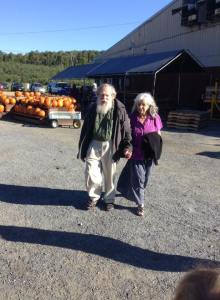Not long before he died, I was complaining to my father I couldn’t persuade any of my kids to go to a Catholic college. I said I knew they were getting decent educations at the places they chose, but still, I was sure my plan was better than theirs. Half jokingly, half dead serious, I groaned, “How will they ever find a nice Catholic to marry?”
My father said, “Well, I found one at Brooklyn Public College!” He was half joking, half serious, too: the joke being that, when he met my mother, they were both about as far from Catholic as anyone could be.
They had both been raised as non-practicing Jews, met at college when they were both cutting class, got married in secret in a hurry, had a second public ceremony to appease the parents, dabbled in Buddhism, moved to a kibbutz in Israel, came home, briefly joined a cult, found the Lord, and then eventually became Catholic — my mother and older sister first, and my father and the rest of us a year later, when they had already been married for about 20 years. They ended up as a happy old married Catholic couple, but they certainly didn’t start that way.
I’ve been thinking a lot about marriage and God’s will and who belongs together and how and why marriages work. It is very true that it’s smart to do a thorough investigation of your own understanding of marriage and of your spouse’s expectations before you take the leap. But it really is a leap. You can’t guarantee that doing everything the smart way will result in a strong or happy marriage, and you can’t guarantee that a strong and happy marriage will stay that way. Sacramental grace is mysterious and unpredictable, and so is human nature. It’s a leap.
My parents made each other truly miserable sometimes. We kids saw a lot of that. You probably could have made the case that they didn’t belong together. But by the end of my parents’ lives, I could think of all sorts of ways that God’s will had indisputably been carried out in their marriage.
Even my mother’s dementia seems to have worked some kind of transformation on my father, and the last years of their lives together did something mysterious but important to him. They weren’t even really together; he just visited her in the nursing home every day, fed her, prayed with her, and was delighted when she would occasionally mumble “amen.” By the time he died, he was a happy man; happier than I ever remember seeing him. And then, her final work done, my mother died too.
Does this mean they were made for each other? Yes and no. They eventually became made for each other, I know that. I know couples who seem so incredibly well suited for each other, it’s hard to imagine them living any other life other than with each other. And I know couples who are monstrously incompatible, and seem to belong with each other even if they don’t make each other very happy. There are all kinds of successful marriages. Marriage is strange. Life is strange.
The other day, we prayed the second luminous mystery of the rosary, which is the Wedding at Cana.
“When the wine failed, the mother of Jesus said to him, ‘They have no wine.’ And Jesus said to her, ‘O woman, what have you to do with me? My hour has not yet come.’ His mother said to the servants, ‘Do whatever he tells you,’” we read.
Jesus hadn’t yet done any public miracles, and apparently didn’t think it was the right time to start yet; but Mary was apparently focused on saving a young couple just starting out from the embarrassment of not being able to serve their guests. We’re all familiar with the somewhat amusing account of mother and son having a little spat, and the mother confidently assuming he’ll do what she says. But it occurred to me for the first time: They are both sinless. This means that neither one of them could have wanted to do something that was against God’s will. And yet they disagreed about what was best to do! What does this mean?
I think it speaks to the notion that God’s will is hardly ever one specific action or decision. Sometimes it is certainly clear: Don’t murder, for instance. Don’t do evil. But it’s much more common, when we’re faced with choices, to be torn between a few different possibilities which might be good, but we’re not sure yet how they will turn out. It’s pretty rare that we can just “do whatever he tells us” and know for sure that we’re doing the right thing. Even when one choice seems like the natural, godly, wholesome choice, and the other seems more murky and less desirable, we really can rarely say, “This one is definitely God’s will, and that one is definitely not”.
We have to take a leap, and the leap is important, but even more so is what comes next. It’s rarely the leap that puts us either in or out of God’s will; it’s what we make of where we landed, and what we do with the grace we find there.
I was mulling all this over when a quote popped up in my Twitter feed. It was a line from one of my favorite “Frog and Toad” stories by Arnold Lobel. Toad, after admiring his friend’s garden, wants to start one of his own. So he plants the seeds, but they don’t immediately sprout. Fretting, and increasingly frantic, he spends the next few days exhausting himself with trying to make it happen: He plays music for them, he reads poems to them, but nothing works. Then Frog gives him some advice:
“Leave them alone for a few days. Let the sun shine on them, let the rain fall on them. Then your seeds will start to grow.”
And this, of course, works. The seeds start to grow. Toad has done the work that’s indispensable: He has put the seeds in the ground. Then he wastes a lot of effort and anxiety trying to force things to work out well in the time he expects. Finally, he gives up and while he sleeps, the larger forces at work, the rain, the sun, and time work to achieve the thing he is longing for. The seeds sprout. He has his garden.
And . . . an angry boy in Brooklyn ends up married to a nice Catholic girl who brings him to Jesus and makes him very happy, eventually. A mother has done her best and then tries to sit back and let her adult-ish children make their choices about college and everything else, because they are adults, ish. Let the sun shine on them. Let the rain fall on them. Let people take their leaps, and let the Holy Spirit do what he does when they land. It really is the only way.
At least that’s what I’m telling myself. I have taken the leap. We’ll see.
***
A version of this essay first appeared in The Catholic Weekly in August of 2021.









































